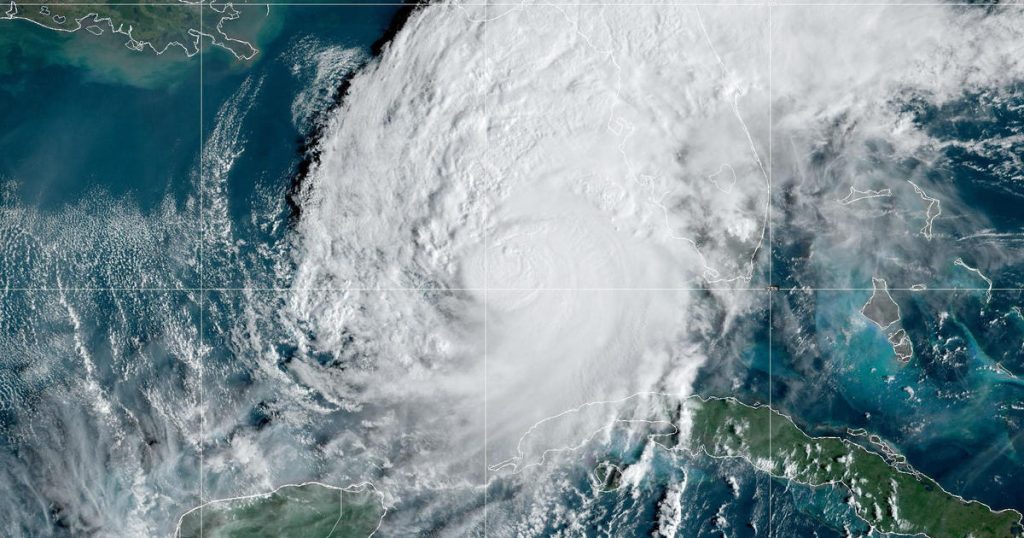Hurricane Milton, a powerful storm that fluctuated between a Category 4 and 5 in the Gulf of Mexico, made landfall near Sarasota as a Category 3 on Wednesday night. The National Weather Service in Tampa Bay described Milton as a “historic storm for the west coast of Florida.” It is the third hurricane to make landfall in Florida in the 2024 Atlantic hurricane season, following Hurricane Helene two weeks ago and Hurricane Debby in early August. Milton is the quickest storm on record to rapidly intensify into a Category 5 in the Gulf of Mexico. On Sunday, the system was a tropical storm with sustained winds of 60 miles per hour. Just 24 hours later, its wind speeds had leapt to 175 miles per hour, far above the Category 5 threshold of 157 mph.
Rapid intensification refers to a storm’s wind speeds increasing by more than 58 miles per hour in a 24-hour window. From 1980 to 2023, 177 Atlantic hurricanes that made landfall had rapidly intensified. About 80% of Category 3-5 hurricanes undergo this process. Hurricane Milton is the strongest storm to form since Hurricane Dorian in 2019 and is the second tropical system of the 2024 Atlantic hurricane season to reach Category 5 strength, following Hurricane Beryl. Human-caused climate change is making it easier for hurricanes to rapidly intensify into more powerful storms, which often bring more coastal flooding and additional rainfall to areas far from the coast, according to scientists.
Since April 2023, global sea surface temperatures have been hotter than any other period on record. Hotter oceans fuel stronger storms, and warmer sea surface temperatures amplify evaporation, transferring heat and water to the air, making hurricane winds stronger and increasing the rain they bring. Climate change fuels stronger storms like Hurricane Milton, which poses a significant threat to communities in its path. With the frequency and intensity of hurricanes on the rise due to climate change, coastal areas and regions prone to flooding must be prepared for the potential impact of future storms.
Hurricane Milton’s rapid intensification and landfall near Sarasota mark a significant event in the 2024 Atlantic hurricane season, with the storm being one of the strongest to form in recent years. The storm’s quick escalation in wind speeds from a tropical storm to a Category 5 hurricane within 24 hours highlights the dangers posed by rapidly intensifying storms in the Gulf of Mexico. Climate scientists warn that human-caused climate change is a contributing factor to the increased frequency and strength of hurricanes, emphasizing the need for global action to mitigate the effects of rising sea surface temperatures and extreme weather events.
As Hurricane Milton moves across Florida and causes widespread damage, emergency response teams and local authorities are working to assess the impact and provide assistance to affected communities. With the potential for coastal flooding and heavy rainfall, residents in the storm’s path are urged to take necessary precautions and evacuate if advised to do so. The aftermath of Hurricane Milton underscores the importance of disaster preparedness and resilience in the face of natural disasters, highlighting the need for ongoing efforts to address the impacts of climate change and develop strategies for climate adaptation in vulnerable regions.
The rapid intensification and landfall of Hurricane Milton serve as a stark reminder of the destructive power of hurricanes and the impact of climate change on extreme weather events. With scientists linking warmer sea surface temperatures to stronger storms and increased rainfall, the implications of climate change on hurricane intensity and frequency are becoming more apparent. As communities in Florida and along the Gulf Coast grapple with the aftermath of Hurricane Milton, the need for proactive measures to address climate change and build resilience against future storms becomes increasingly urgent. By understanding the connections between climate change and extreme weather events, society can better prepare for the challenges posed by a changing climate and work towards sustainable solutions to mitigate its effects.


